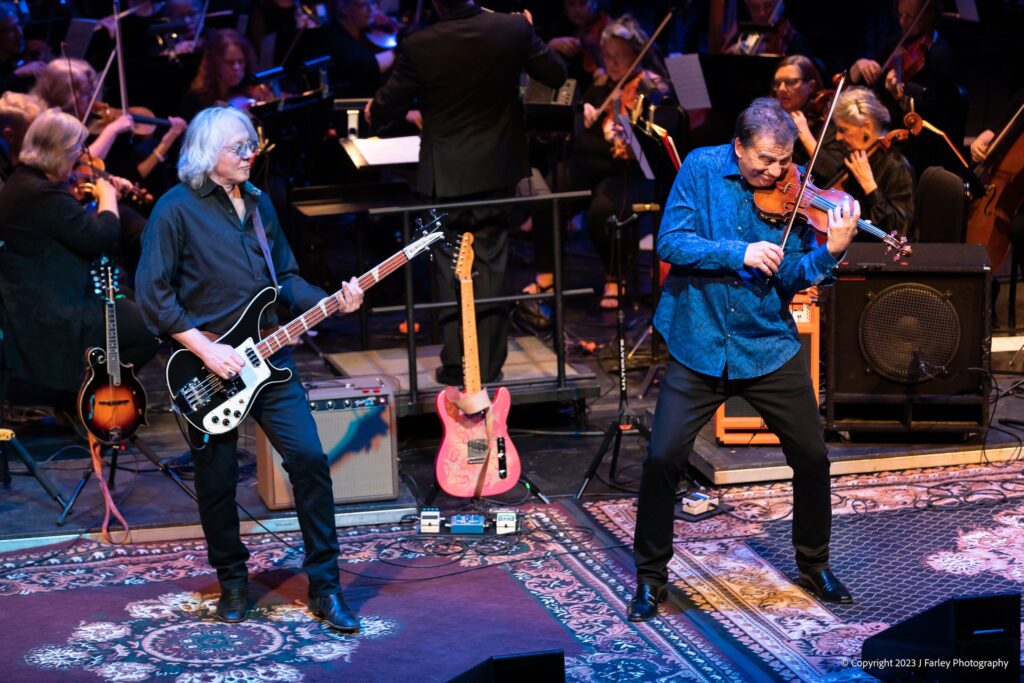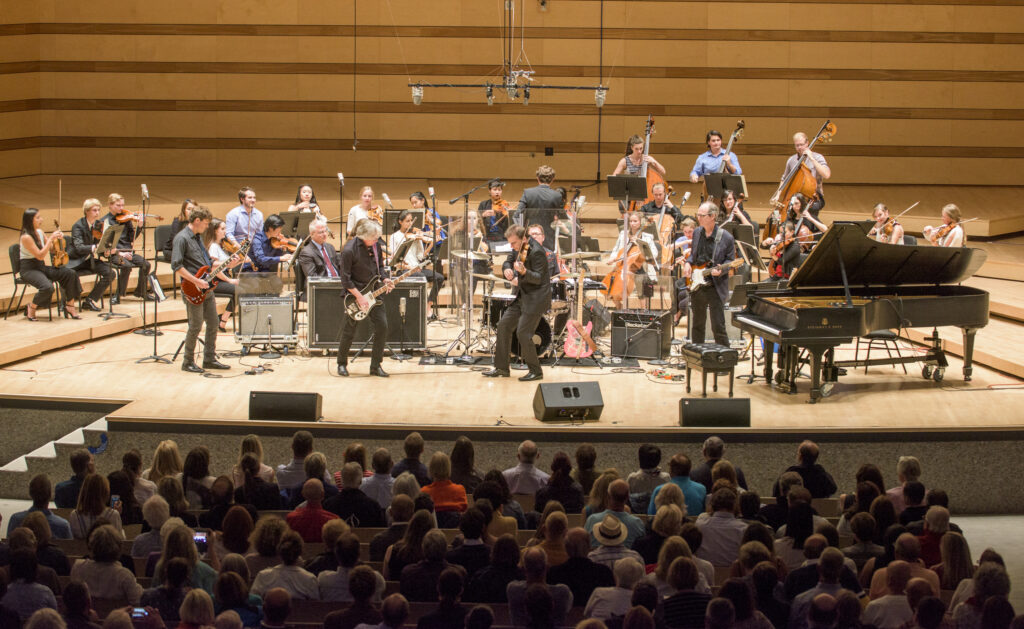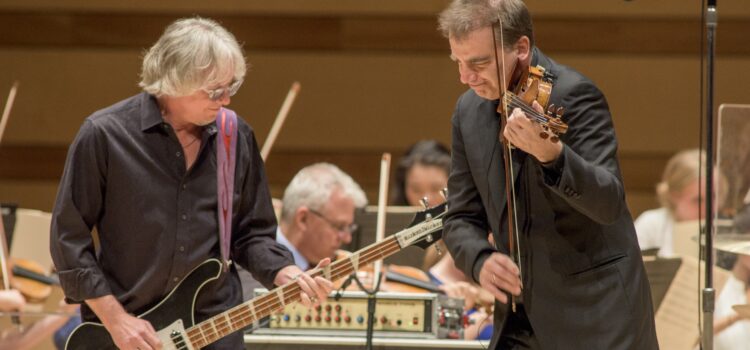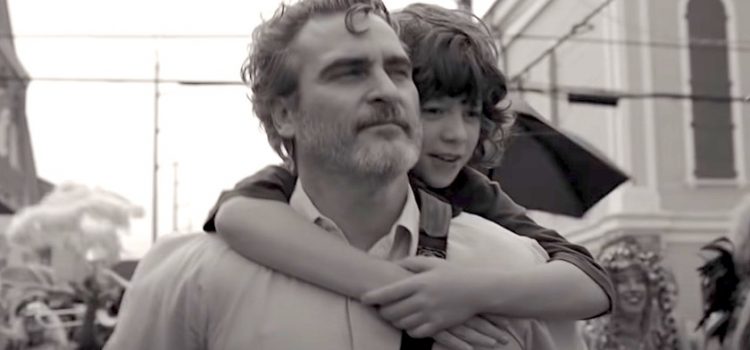By CB Adams
It must have been a challenge trying to fill the Stifel Theater on April 5 for a program with the St. Louis Symphony and guest conductor Ward Stare playing backup band to The Music of R.E.M. Die-hard symphony goers might have resisted a hybrid program of orchestral interpretations of R.E.M. songs and the “Concerto for Violin, Rock Band and String Orchestra” by the band’s bassist, Mike Mills.
The program might have been overshadowed by the reputation of R.E.M., one of the most influential rock bands from the early 1980s to the early aughts, known for their melodic-yet-enigmatic sound, poetic lyrics and the distinctive vocals of frontman Michael Stipe.
On the other side of the spectrum die-hard R.E.M. fans who want nothing less than the band to reunite (good luck with that), might have resisted the program for softening and diluting R.E.M.’s potent oeuvre. Despite the challenges of such perceptions or expectations, St. Louisans delivered a respectable showing while the symphony Mills delivered a satisfying experience that beautifully integrated rock elements into classical structures.
The first half of the performance were two sets of “Orchestral Reconstructions” of R.E.M. songs by composers Carl Marsh and David Mallamud. It is these two composers who deserve the kudos for this portion of the program – come for the R.E.M., stay for Marsh, Mallamud and the SLSO.
Emphasizing a desire for originality, Mills expressed his preference for orchestral pieces that incorporated R.E.M. melodies in innovative ways rather than relying on conventional symphonic embellishments. And that’s exactly what was most interesting and intriguing about these works.
Other than the occasional recognizable phrase, they weren’t really recognizable as R.E.M. songs. Even if you knew nothing of R.E.M., these reconstructions stand alone as enjoyable experiences. For instance, you wouldn’t miss Stipe’s plaintive howl in “Cuyahoga” even if you knew the song – that’s how differently distinctive Marsh’s interpretation is.

Several years ago, Mills approached Marsh with a commission, inviting him to “deconstruct” several R.E.M. songs (a mix of hits and personal favorites) and create new orchestral compositions from their elements. Marsh is known for his eclectic blend of classical orchestration and contemporary electronic elements, crafting immersive soundscapes that traverse genres with depth and innovation.
Mills tasked Marsh deconstructing five R.E.M. songs: “Pilgrimage” from Murmur (1983), “Cuyahoga” from Life;s Rich Pageant (1986), “Near Wild Heaven” from Out of Time (1991), and “Try Not To Breathe” and “Everybody Hurts” from Automatic for the People (1992). Marsh’s approach to “Everybody Hurts,” R.E.M.’s iconic song, involved exploring variations of the dominant piano line’s triplet patterns.
To complement Marsh’s contributions, Mills enlisted David Mallamud, a renowned composer and arranger, to deconstruct another set of R.E.M. songs. Mallamud’s selections included “Fall on Me” from Life’s Rich Pageant (1986), “It’s the End of the World as We Know It (and I Feel Fine)” and “The One I Love” from Document (1987), “Find the River” and “Man on the Moon” from Automatic for the People
(1992), and “Supernatural Superserious” from Accelerate (2008).
Mallamud’s approach differed from Marsh’s, resulting in a single long suite composed of his six deconstructed pieces that began that flowed from the Intro and Bargaining through Denial, Anger, Depression and Acceptance. All interpretations were strong, but the last song, a jaunty “It’s The End of the World As We Know It” was the clear crowd-pleaser.
The second half of the performance featured Mill’s own “Concerto for Violin, Rock Band, and Orchestra,” which is a hybrid of a song suite and a true concerto. The piece is a collaboration between Mills and lifelong friend and violin virtuoso Robert McDuffie, who is known for his appearances with prestigious ensembles like the New York and London Philharmonic Orchestras.
Debuting in 2016, the concerto has been performed a dozen times and explores a unique fusion of rock and classical elements. Unlike previous attempts at blending these genres, the concerto stands out for its focus on melody, effectively marrying the raw energy of rock with the sophistication of a string ensemble.
Divided into six sections, the concerto resembles more of a diverse suite than a cohesive violin-centric composition. Notably, the orchestration and additional music contributions from David Mallamud underscore the collaborative nature of the piece. As you might expect, the rock influence predominated during this performance, with Mills assuming his role on bass alongside McDuffie, William Tonks on guitar and Gerry Hansen on drums.
Unlike previous attempts at blending these genres, the concerto stands out for its focus on melody, effectively marrying the raw energy of rock with the sophistication of a string ensemble. This was most evident in “Stardancer’s Waltz,” during which McDuffie fully explored a variety of riffs that could make the tune an enduring standard.

He showcased remarkable confidence and strength in his rendition of melody lines and demonstrated mastery in precision, fluidity and speed. He also displayed skills that would challenge even the most adept electric guitarists, which contributed immensely to the success of this hybrid concerto.
Another crowd-pleaser was “A Little Nightswimming,” a poignant, piano-driven track from R.E.M.’s acclaimed 1992 album, Automatic For The People – and a personal favorite. “Nightswimming,” is one of the best songwriting achievements that Mills made with R.E.M. and the concerto’s version was a beautiful, graceful duet between Mills and McDuffie.
For those who took a chance on the SLSO’s R.E.M. performance (let’s call ourselves shiny, happy people), the experience demonstrated that the mutability of music is a big tent that can accommodate hybridizations among genres. After all, classical composers from Bartók and Dvořák to Copland and Williams have drawn folk songs and popular music, infusing classical compositions with the rich cultural
tapestry of their respective regions. And you can add Mills to that list.

CB Adams is an award-winning fiction writer and photographer based in the Greater St. Louis area. A former music/arts editor and feature writer for the St. Louis Globe-Democrat, his non-fiction has been published in local, regional and national publications. His literary short stories have been published in more than a dozen literary journals and his fine art photography has been exhibited in more than 40 galley shows nationwide. Adams is the recipient of the Missouri Arts Council’s highest writing awards: the Writers’ Biennial and Missouri Writing!. The Riverfront Times named him, “St. Louis’ Most Under-Appreciated Writer” in 1996.




